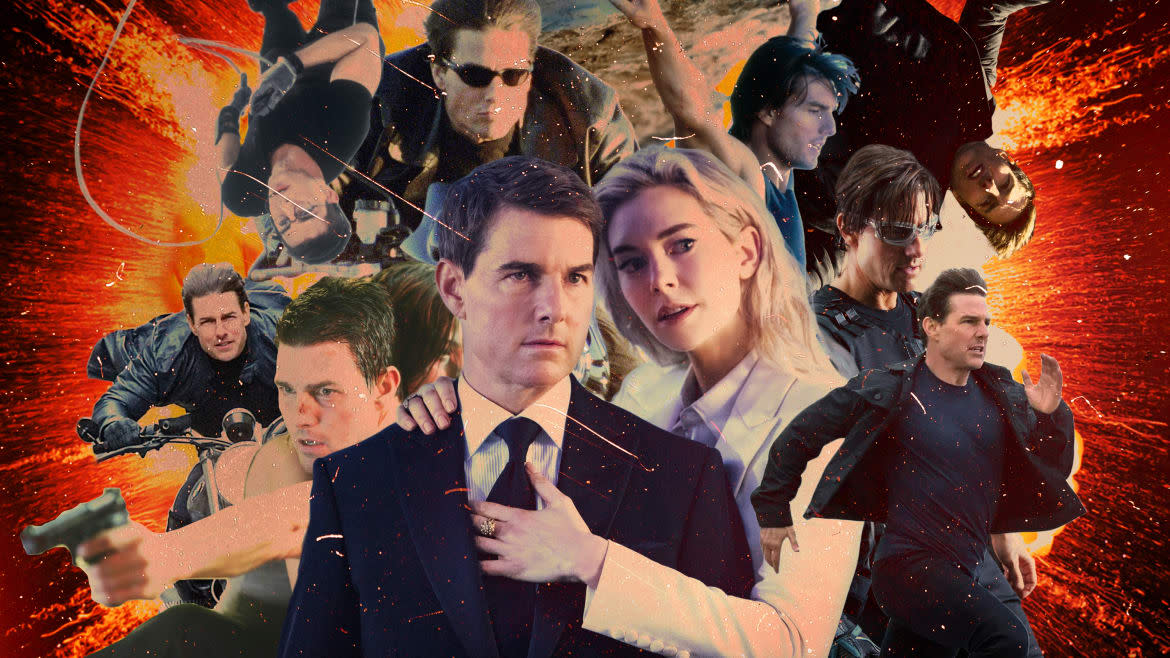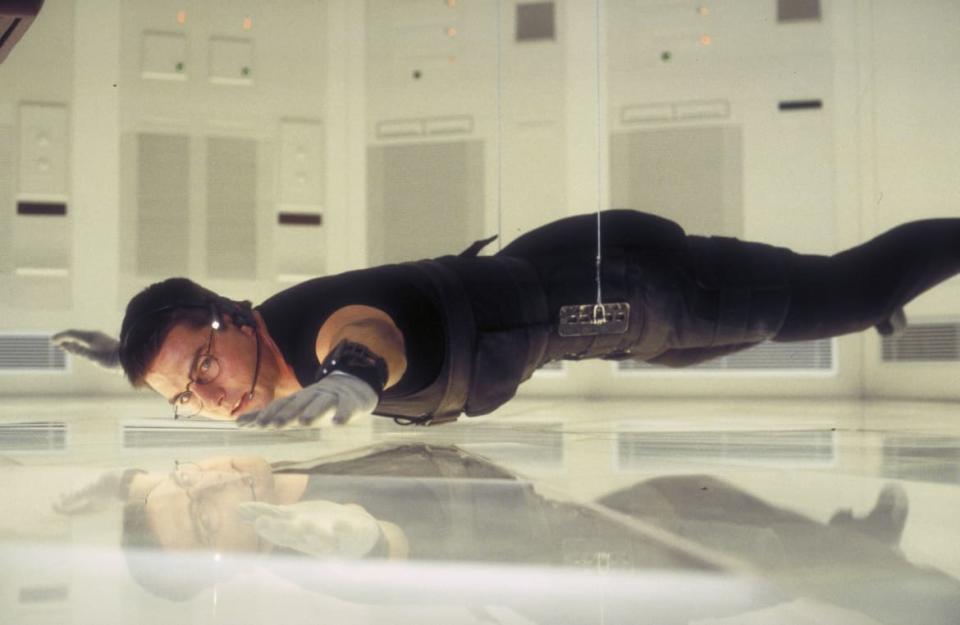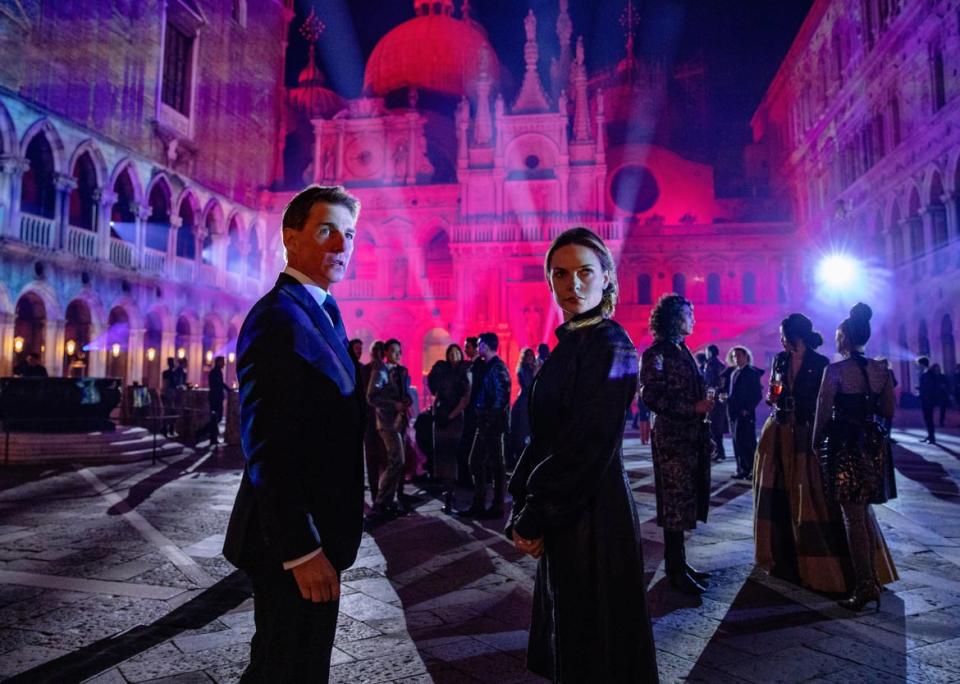The ‘Mission: Impossible’ Movies Are as Personal as Tom Cruise Gets

- Oops!Something went wrong.Please try again later.
- Oops!Something went wrong.Please try again later.
- Oops!Something went wrong.Please try again later.
When Mission: Impossible III raced into theaters in the summer of 2006, it arrived with a fireball of controversy at its back. This was, after all, the first starring role for Tom Cruise after he blew up his public image the previous year. By now, the details of how the actor’s reputation imploded are the stuff of PR-firm legend, a cautionary tale for the ages. There was the row with Matt Lauer on the Today Show, and the appearance on Oprah where he leapt on the couch to convey his supposed ardor for girlfriend (and soon-to-be fiancée) Katie Holmes—a performance that made him look more unhinged than besotted. And there were the increasingly unsavory revelations about his role in the Church of Scientology, which would continue to shift into unflattering focus in the years to come, spilling from the pages of Going Clear.
M:I III was supposed to make us forget all that. But the funny thing about the movie was how much it seemed to reflect, and even channel, the conflicts of Cruise’s very bad year. The plot, in which Cruise’s Ethan Hunt has to stop a nefarious arms dealer who’s kidnapped his wife (Michelle Monaghan), essentially collides the personal and professional lives of the hero. Back in 2006, as we watched Cruise’s secret agent sprint across rooftops to save his true love, it was hard not to think of that notorious bounce on the couch. We were seeing devotion, the power source of any wife guy, converted into pure kinetic energy.
Tom Cruise’s Stunts Are as Spectacular as You Hoped in New ‘Mission: Impossible’
Art imitates life fairly often in the Mission: Impossible movies. On the (glorious) surface, there’s nothing remotely personal about these finely tuned set-piece machines, which send Hunt and his team of fellow espionage experts through an escalating series of life-or-death dilemmas. Yet they remain passion projects for Cruise—and, in the control he’s exerted over the shape and direction of the series, a way for him to express himself. Parallels to his real life are as inevitable as they may be accidental; that they’re all over the latest, seventh entry in the series, Mission: Impossible–Dead Reckoning Part One, is a reminder of how consistently the series has operated as a shadow meditation on Cruise's time in the spotlight.
The franchise has been the backbone of Cruise’s career—and maybe his career rehabilitation—for decades. To survive the tabloid scandals that threatened his marquee appeal, he closed the window to his private life and reinvented himself as a tireless entertainer, devoting himself to his craft and his fans. Nearly two decades later, he’s committed mostly to action vehicles that lean on his movie-star charisma more than his chops.
To that end, Ethan Hunt has always been an ideally uncomplicated role for the star, at least in theory: He’s a figure of idealized heroism, largely devoid of personality traits beyond a virtuous refusal to accept defeat or stop at anything to save the day. We’re meant to look at him and see all of Cruise’s most attractive qualities—his good looks, his charm, his work ethic—and none of his unattractive baggage.

Tom Cruise in the original Mission: Impossible.
Over the years, Cruise has steadily collapsed any discernible distinction between man and character. The astonishing stunts he insists on performing himself—like that motorcycle leap off the mountain in Dead Reckoning, heavily featured in its promotional materials—are more than extra publicity. They’re also a rather extreme form of method acting, in which Cruise fuses his own exertion with Hunt’s; there’s an extra layer of disbelief and excitement to the agent climbing the world’s tallest building or leaping out of an airplane, because we see, and know, that Cruise is doing it for real. That makes the Mission: Impossible movies almost like documentaries of their star’s reckless determination—and, in a sense, veiled self-portraits of a guy willing to do anything to get the job done.
Cruise’s love life, now an indefinite question mark, looms over Mission: Impossible. If Part 3 vaguely evoked the difficulty in balancing his responsibility to “home” and “office,” the following installment, 2011’s Ghost Protocol, arguably extended the metaphor further. Here, Hunt has broken things off with Monaghan’s character, nobly saying goodbye to his wife to protect her from exposure. That the movie’s production dovetailed with the very messy dissolution of Cruise’s marriage to Holmes only underscored its resonance as a sentimental, maybe self-flattering mirror of what was going on beyond the movie cameras, in the world Cruise hid from the world.
Hunt has remained pointedly single in the sequels since Ghost Protocol, in parallel to Cruise’s own perpetual bachelorhood. The closest Mission: Impossible has come in its later entries to giving him a love interest is Ilsa Faust (Rebecca Ferguson), the MI6 agent introduced in the fifth film, Rogue Nation (2015). Ilsa is Hunt’s perfect match, his equal: a heroine every bit as determined and competent as him. That she and Hunt are always dancing around each other, never quite consummating their mutual attraction, lends their quasi-romance a strong melancholy. It’s awfully alluring to see her as Cruise’s dream of a perfect partner, always just out of reach. That Ilsa is basically a female version of him is perhaps revealing.
All of the M:I movies have a self-reflexive quality, encouraging us to process them as tantalizing glimpses into the mind and heart of their headliner. But Dead Reckoning might be the one most plainly freighted with subtext. That begins with how it seems to internalize Cruise’s own vain, mythologizing self-image as the “Last Movie Star,” fighting to save Hollywood from itself. The film’s villain, after all, is an evil, sentient algorithm. Is Cruise abstracting his resistance to the streaming machine, reconfiguring Hunt as a symbolic savior of the endangered movie-theater experience? The interpretative possibilities don’t end there. The Entity, as the computer virus is called, could also be a manifestation of the industry’s reliance on digital spectacle, in contrast to the physical stunt work Cruise prefers.
‘Top Gun: Maverick’ Is a Spectacular Tribute to Tom Cruise
In a more psychodramatic way, Dead Reckoning also traipses back into relationship matters. The other villain, the mysterious Gabriel (Esai Morales), at one point sneers that Hunt uses women. It’s an accusation that stings our hero, and which uncomfortably echoes some of the real-life claims made about the church’s role in matchmaking for its most famous convert. It’s probably a stretch to see anything truly confessional here; the arc of Dead Reckoning’s concluding chapter, due next summer, will probably be a refutation of the bad guy’s words, a defiance of his character assassination. But there’s no denying that a certain cloud of guilt hangs over the movie, especially when Hunt is forced to choose between saving one woman or another.
And if you really want to read between the lines, what does the Impossible Mission Force really represent? It’s a secret org that claims to be fighting to save the world from dangerous people; demands its members cut all ties with family and friends, and devote themselves fully to the cause; and which will disavow (and stalk) suspected traitors at the drop of a hat. In Dead Reckoning, the temptation to draw connections only intensifies. We learn, for instance, that Hunt and his team were all essentially blackmailed into joining the IMF, with prison the only alternative to "accepting the mission." And much of the movie revolves around Hunt’s dogged attempts to recruit a new member, the pickpocket Grace (Hayley Atwell)—a task he goes about with some degree of ambivalence, even ruefully. There’s a wealth of potential, coded meaning in Hunt’s love-hate relationship with his employers, whose inconsistent support forces him to constantly go rogue.

Tom Cruise and Rebecca Ferguson in Mission: Impossible - Dead Reckoning Part One.
Press Cruise about any of these real-life parallels, and he’d probably evade: The star is nothing if not committed to the image of his career as a source of apolitical fun—the platonic ideal of escapism, as it’s traditionally been defined. But he’s been making these movies for more than 25 years, and not passively. His creative control over them may be a form of diligent image management, but it’s also allowed inescapable hints of autobiography to creep into their margins, maybe betraying how Cruise sees himself—or how he’d prefer to be seen.
How Scientology Protected Tom Cruise and John Travolta—and Banished Nicole Kidman
And in a way, the impersonality of the Mission: Impossible movies is its own kind of personal touch: To watch Ethan Hunt shed any vestiges of a life in service of the mission is to see a phantom reflection of Cruise’s own disappearance into the full-time role of a showbiz showman, always wearing the mask of a perpetual smile for the flashbulbs.
Get the Daily Beast's biggest scoops and scandals delivered right to your inbox. Sign up now.
Stay informed and gain unlimited access to the Daily Beast's unmatched reporting. Subscribe now.

